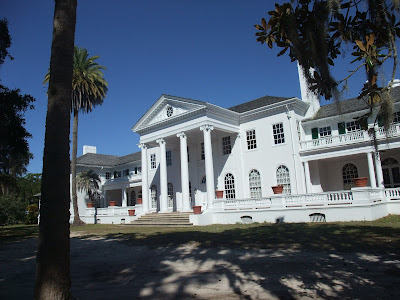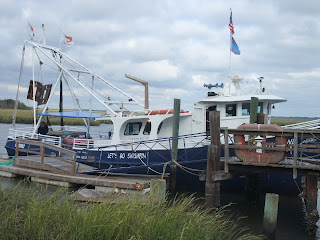After leaving Savannah, we began our trek down scenic Highway 17 to Brunswick, St. Simon's Island, Sea Island and Jekyll Island. The Golden Isles are barrier islands that can be found along the Georgia coast.
They're named the "golden isles" because of their vast marshes that turn a beautiful golden color in the fall. Most of them are especially dramatic when lit by the setting sun.
They're named the "golden isles" because of their vast marshes that turn a beautiful golden color in the fall. Most of them are especially dramatic when lit by the setting sun.
 |
| While we were on the boat, they caught horseshoe, spider and blue crabs, flounder, stingrays, pufferfish, two beautiful sharks and, of course, shrimp. Best of all, we could touch a lot of the sea life if we dared. |
 |
| The views were magnificent with lots of sea gull action off the stern of the boat. |
 |
Sunset at the end of Shrimpin' on the Lady Jane was grand. Jekyell Island known as the heyday resort of the Millionaires Club between 1890-1947 is still a tranquil and serene spot today. Its historic village has the grand Jekyell Island Club Hotel, old cottage mansions of wealthy gentry families like J.P. Morgan, Rockefeller, Joseph Pulitzer, and Goodyear, and the Sea Turtle Rehabilitation Center.  On St. Simon’s Island we enjoyed a long walk on the beach, checked out Christ Church, and visited the ruins of what was Fort Frederica and its colonial village settlement-- an early-1700s British outpost built, mainly, to defend Savannah to the north from Spanish Florida in the south.  Tiffany stain glass window inside Christ Church  Frederica Fort sits as tabby ruins today Heading to the town of Historic St. Marys has wrapped up our last days in Georgia. It allowed the chance to board a ferry for the day trip to visit remote Cumberland Island. The largest of Georgia’s barrier islands, it was the one most filled with romance, history, and intrigue. Cumberland Island is a preserved national seashore which does not allow any vehicle traffic other than the National Park Service.  We spotted some of the 200 wild horses on Cumberland Island  A six hour National Park Service tour of the island by van on unpaved roads for 17 miles became quite an adventure. It enabled us to learn about the wild horses, loggerhead sea turtles, wild turkeys, armadillos, sand dunes, maritime forests, and salt marshes there.  Plum Orchard stands as the former home of George and Margaret Carniege on the Island The island's past tells a tantalizing story of the Timucuan Indians, the French, the Spanish, pirates, wars, steel magnates, cotton plantations, Dungeness ruins, and the Greyfield Inn. Her fame spread internationally when, in 1996, JFK, Jr. wed there in this tiny First African Baptist Church.  She is an island of pristine sandy beaches and beautiful ancient oak canopies. There is a mystical sense of wonder and quiet splendor here which only visitors are able to carry away in their heart. |
As we cross the Georgia-Florida border to Amelia Island and Fernandina Beach next, does that define us officially as snowbirds? Well perhaps, at least through the month of November in Florida, until we take wing to fly home for the holidays and nest awhile.






